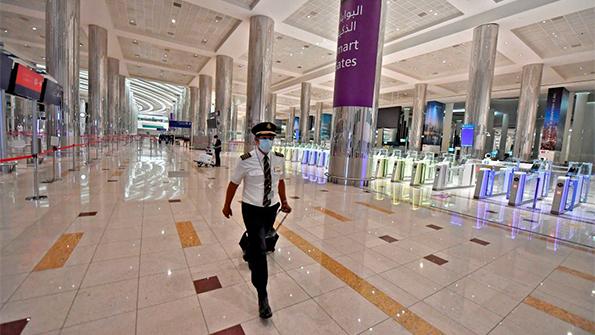
Major Middle Eastern airlines are likely to emerge smaller but intact from the effects of the COVID-19 pandemic.
By end of 2019, the region’s three majors—Emirates Airline, Etihad Airways and Qatar Airways—had turned in varying financial performances. Etihad was transforming from a super-connector to a smaller company more focused on point-to-point services and had improved its financial performance over the year, but only in the sense of reducing its losses to around $870 million, compared to the previous year’s deficit of $1.28 billion.
Qatar Airways continues to suffer from the country’s diplomatic spat with surrounding nations, which forces all of its flights to depart and approach Doha over the Gulf, adding around 20 minutes and accompanying costs to every flight. The carrier turned in a loss of $637 million.
However, Qatar sprang one of the biggest surprises of the year to date by announcing in February that it had reached a rapprochement with American Airlines, previously one of its most bitter critics over alleged government subsidies to the Gulf carrier. The carriers announced that they would re-establish their codeshare agreement, in what was described as the first stage of a “strategic relationship.” This also likely means the question of Qatar Airways oneworld membership is now closed. Qatar Airways Group CEO Akbar Al Baker had previously threatened to exit the global alliance, but the renewed partnership with American, a oneworld founding member, appears to have settled the matter.
Meanwhile, Emirates’ annual figures, which incorporated the start of the dip from the pandemic, were by far the best, with the carrier turning a profit of $288 million, up 21% on the previous year.
However, the Dubai-based carrier faces a particular problem through owning the world’s largest fleet of Airbus A380s, which were losing popularity (with airline accountants, if not passengers) even before the pandemic. Under outgoing president Tim Clark, Emirates has conducted a root-and-branch network review and its order book shows a move to smaller Airbus A330neos and A350s, plus Boeing 787-10s.
The fate of the A380s remains unclear. After initial suggestions that as many as 45 could leave the fleet of 115, Clark said in a June webinar with ATW editors that the entire fleet could be retained. Much, however, depends on how quickly demand returns after the pandemic.
Al Baker has said that his 10 A380s will be parked until at least 2021 and may never return to service. The status of Etihad’s fleet of 10 A380s is also unclear, with the possibility of them never returning to operations, despite the oldest having been in service for just six years.
Elsewhere in the Gulf, Saudia and fellow Saudi hybrid carrier flynas face a unique additional problem. Restrictions by Saudi authorities on this year’s hajj pilgrimage because of the pandemic will have a significant negative effect on both carriers, which normally transport large numbers of pilgrims from as far afield as southeast Asia and West Africa, leasing in widebodies to cope with the numbers involved.
In other parts of the region, Royal Jordanian warned in late June that it needs to obtain direct and indirect government support to face the current crisis and to stay in business.
Middle East Airlines is possibly in a more perilous position, given the pre-existing crisis in the Lebanese economy, which makes the chances of a bailout from the government in Beirut less likely.
EgyptAir, meanwhile, is seeking a $185 million loan from the Egyptian government as support during the pandemic.
The most intriguing scenario in the region is about to play out in Abu Dhabi, where two LCCs—Air Arabia Abu Dhabi, a coupling of Air Arabia and Etihad, and Wizz Air Abu Dhabi (WAAD), which combines the Eastern European ULCC with Abu Dhabi backers—will compete for passengers from the latter part of this year.
Wizz Air CEO József Váradi said WAAD plans a network that will incorporate not only routes to Eastern Europe, but also intra-Gulf services and others toward the Indian subcontinent.

